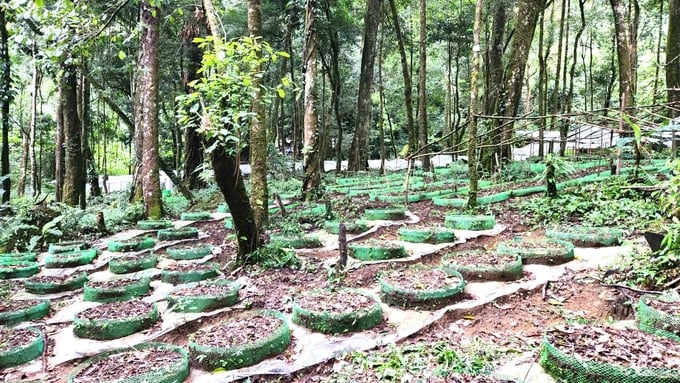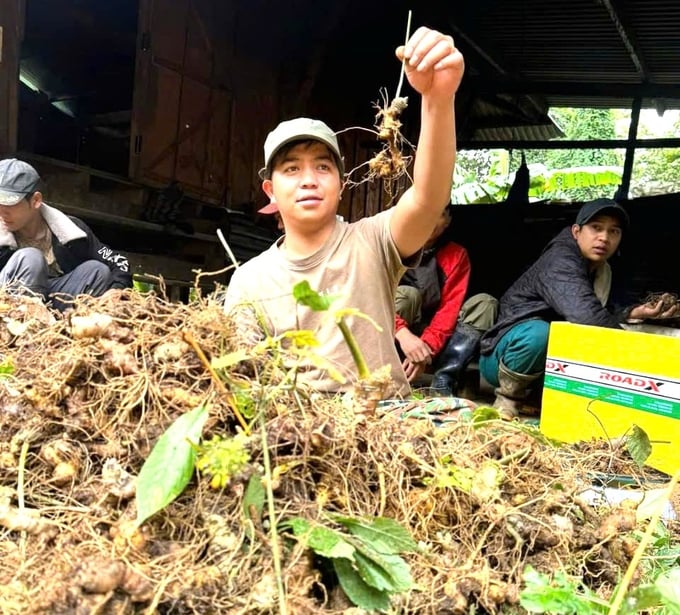May 24, 2025 | 16:18 GMT +7
May 24, 2025 | 16:18 GMT +7
Hotline: 0913.378.918
May 24, 2025 | 16:18 GMT +7
Hotline: 0913.378.918

The Xo Dang people cultivating Ngoc Linh ginseng under forest canopies in Tu Mo Rong District. Photo: DL.
The Kon Tum Provincial People’s Committee recently approved a scientific and technological project to expand the geographical indication protection for "Ngoc Linh" ginseng products within Kon Tum Province.
The project, scheduled for implementation in 2025, is part of Kon Tum’s intellectual property development program for the years between 2021 and 2030. Accordingly, the Provincial People’s Committee has tasked the local Department of Science and Technology with selecting stakeholders responsible for leading the approved project.
The project’s overarching goal is to establish a scientific and practical foundation that allows Kon Tum Province to register for the expanded geographical indication protection for "Ngoc Linh" ginseng products. Specifically, it aims to secure a protection certificate from the Intellectual Property Office for the extended geographical indication of "Ngoc Linh" for ginseng products in Kon Tum.
The research will focus on developing the scientific and practical foundation to register for the expanded geographical indication protection for Ngoc Linh ginseng in various communes across the province. Several notable project sites include Tu Mo Rong, Dak Ha, Dak Sao, and Dak Ro Ong in Tu Mo Rong district; Dak Man (excluding sub-areas 16, 17, 18, 20, 22, 25, and parts of sub-areas 19, 21, 23, and 24), Dak Plo, Dak Nhoong, and Dak Choong (excluding sub-areas 59, 60, 65, and parts of sub-areas 19, 21, 23, and 24) in Dak Glei District; and Dak Tang, Mang But (Kon Plong district) and Dak Koi (Kon Ray District). Additionally, the project will compile a registration dossier for the expanded geographical indication of "Ngoc Linh" ginseng products to the Intellectual Property Office.

Many Xo Dang households in Tu Mo Rong have achieved prosperity through Ngoc Linh ginseng cultivation. Photo: DL.
Vo Trung Manh, Chairman of the Tu Mo Rong District People’s Committee, reported that local communes currently holding geographical indication (GI) protection for Ngoc Linh ginseng roots include Dak Na, Mang Ri, Ngoc Lay, Ngoc Yeu, Van Xuoi, and Te Xang.
With the GI protection, Ngoc Linh ginseng has established a trusted brand among consumers seeking health benefits, thereby elevating its reputation within the province. In protected areas, Xo Dang farmers and businesses have formed partnerships to cultivate Ngoc Linh ginseng under the forest canopy, allowing both stakeholders to enjoy mutual benefits and accumulate wealth. Many Xo Dang farmers have become millionaires through ginseng cultivation, with some households earning as much as 10 billion VND annually from selling ginseng seeds.
In addition to the six GI-protected communes, four other communes—Tu Mo Rong, Dak Ha, Dak Sao, and Dak Ro Ong—are currently being considered for geographical indication expansion. These areas feature optimal conditions for Ngoc Linh ginseng cultivation, with rich soil, high altitudes, cool climates, and most importantly, old-growth forests. Trial ginseng cultivation in the aforementioned communes has indicated that Ngoc Linh ginseng grows exceptionally well in local conditions.
“The Provincial People’s Committee’s approval of the scientific and technological project to expand geographical indication protection for the local Ngoc Linh ginseng root products is a timely decision, providing a solid foundation for stakeholders to expand Ngoc Linh ginseng cultivation areas. Furthermore, this decision will offer the Xo Dang community greater opportunities for wealth generation through Ngoc Linh ginseng,” Chairman Vo Trung Manh stated. “The district stands ready to cooperate with designated research units and ensure the project’s timely completion, thereby helping the local community to prosper through its native resources.”
Nguyen Minh Tri, Vice Chairman of Mang Ri Commune People’s Committee, explained that the Xo Dang people view Ngoc Linh ginseng as a means to achieve prosperity. However, coverage in Dak Don village was initially limited due to the deep and mountainous terrain, which negatively impacts farm management and prevents the installation of surveillance cameras.
In response, the Tu Mo Rong District People’s Committee promptly constructed a signal station in Dak Don village with the aim of aiding local residents in protecting their ginseng farms. As a result, the strengthened signal has allowed numerous residents to install surveillance cameras along their farm plots and main routes. This technology-driven approach has enhanced farm management, improving security for local growers. Approximately seven households have installed cameras to protect their ginseng farms, benefiting many others who gain from the shared management capabilities this technology brings.
Translated by Nguyen Hai Long

(VAN) The People's Committee of Tra Vinh province has approved an adjustment to the investment policy for the Green Hydrogen Plant project, increasing its area to approximately 52.76 hectares.
![Reducing emissions from rice fields: [2] Farmers’ commitment to the soil](https://t.ex-cdn.com/nongnghiepmoitruong.vn/608w/files/news/2025/05/05/dsc08881jpg-nongnghiep-140632.jpg)
(VAN) Clean rice cultivation model in Thuong Tan commune, Bac Tan Uyen district, is assisting local residents in achieving sustainable agriculture by substantially reducing costs, increasing productivity, and protecting the environment.

(VAN) At the conference to disseminate Resolution No. 68, AgriS introduced its digital agricultural ecosystem and reaffirmed its commitment to accompanying the Government in promoting private sector development and sustainable agriculture.

(VAN) 'Blue Ocean - Blue Foods' initiative is designed to restore marine ecosystems and establish sustainable livelihoods for local communities by cultivating a minimum of 1,000 hectares of cottonii seaweed in the first three years.
/2025/05/21/4642-3-112707_603.jpg)
(VAN) The V-SCOPE project has made direct contributions to three out of six pillars of the Comprehensive Strategic Partnership between Vietnam and Australia.

(VAN) Facing the threat of rabies spreading to the community, Gia Lai province urgently carries out measures to vaccinate dogs and cats on a large scale.

(VAN) Disease-free livestock farming not only protects livestock herds but also stabilizes production and livelihoods for many farmers in Tuyen Quang.